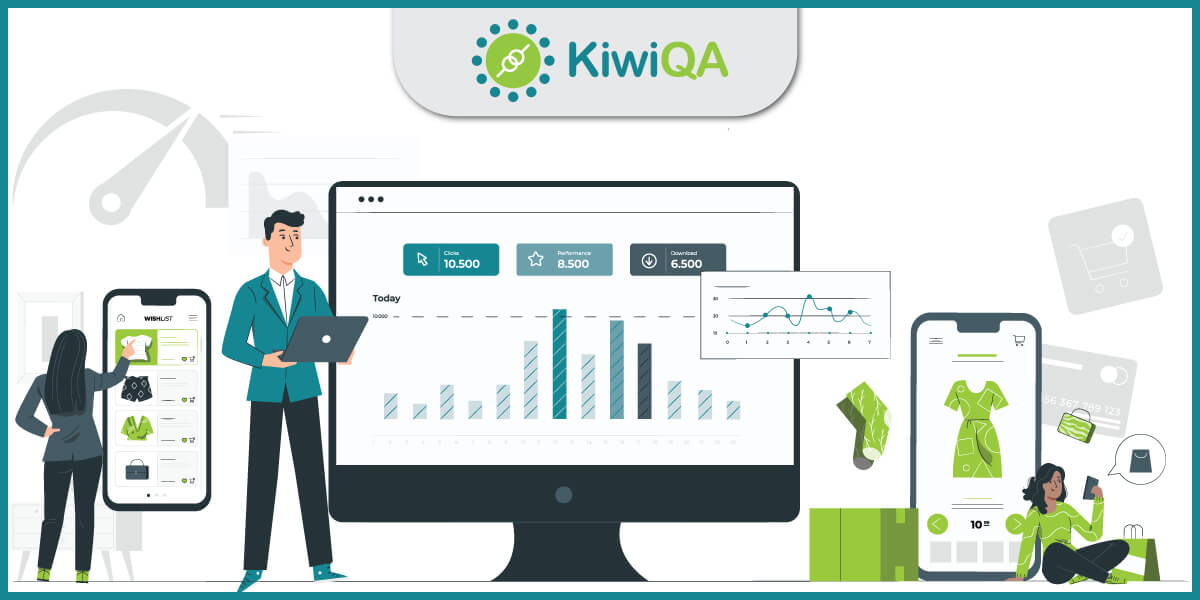Why Performance Testing Is A Top-Priority For E-Commerce Business?

 KiwiQA
KiwiQAOnline commerce (or e-commerce) has become more relevant than ever before. The COVID-19 pandemic has accelerated the push towards online commerce and the rising trend can be observed even in emerging economies.
As per reports[1], one in three customers wait for less than seconds before abandoning the checkout. Many e-commerce companies (including the behemoths) struggle at keeping up pace when there is a huge inflow of orders (especially during the holiday seasons).
This is where software performance testing plays a key role in ensuring that performance of the website does not deteriorate even when there is unusually high traffic on the website. Page load time and response time are the most vital factors when it comes to e-commerce businesses. A frustrating end-user experience will not only result in a decline in sales, but will also damage the brand reputation of the e-commerce company.
To put it in simple words, response time is inversely proportional to the website’s success factor. Since customer conversions depend on the website performance, it is important for e-commerce businesses to take performance testing on a high priority.
In this blog, we look from the lens of an e-commerce business owner for solving issues related to website performance.
Performance testing falls in the non-functional testing category. It is majorly done to test the speed, scalability, reliability, and performance of the website.
Some of the major types of performance testing are load testing, spike & soak testing, scalability testing, and resilience testing. Performance testing should be considered from the beginning of the product development; else it might be too late to tackle the performance issues once the business has witnessed a sizeable growth.
Irrespective of whether you are using traditional SDLC or Agile model, performance testing should be an integral part of the testing strategy. In case you do not have in-house resources with experience on performance testing, you should on-board a strategic partner (i.e. performance testing company) like KiwiQA that can provide performance testing services at scale.
Also Read – Key Performance Metrics for Effective Performance Testing
Now that we have touched upon the integral aspects related to performance testing in e-commerce, let’s look at the why and how of performance testing in e-commerce applications.
Most major e-tailers have a huge customer base that is spread across different geographical locations. Peak load testing should be done on a regular basis, since the peak load would increase significantly during the holiday season, sale season, etc.
This helps in delivering an exceptional customer experience which eventually helps in improving the business. Here, major focus should be laid on testing the app (or website) on different browsers and devices.
The marketing team also needs to get involved with the technical team to deep dive into the planning and execution of geography-specific campaigns. Performance tests should be extensively conducted during the festive season since that is the time, e-commerce companies can expect the maximum amount of traffic.
Also Read – Why Load Testing Is Important For Your Website?
We are living in a mobile-first world. Many potential customers would interact with your website (or app) on the mobile phones. Performance testing on mobiles ensures that the site (or app) does not witness deterioration in the performance under peak loads.
Major challenge in performance testing on mobile devices involves prioritizing mobiles, browsers, and platforms on which tests need to be performed. Testing on widely used devices helps in ensuring that the performance of the app (or site) is retained under heavy loads.
Database is one of the critical elements of any e-commerce website. Your customer information, order information, inventory information, and other such useful data is stored in the database. Along with the database, servers should also be utilized in an optimal manner.
Server downtime could impact e-commerce business in a huge manner. Performance testing of e-commerce application monitors all the essential components of the website (or application). Database, load balancers, servers, front-end of website, etc. must be monitored on a regular basis. Load tests and stress tests are instrumental in mimicking the load on the server; thereby ensuring that the site performance is on par even when there is actual load on the server.
A number of performance testing tools are available in the market that comprise of licensed as well as open-source tools. Apache JMeter, BlazeMeter, Load Impact, Rationale Performance Tester, etc. are some of the widely used performance testing tools.
You should choose the best-suited tool that fits the needs of testing your e-commerce website (or app). Performance testing of e-commerce website (using any of the above tools) helps in testing a number of facets like user behavior, user engagement, user concurrency on the site, etc. that can make or break the website behavior.
Performance tests like spike test, load test, endurance test, and isolation test ensures that the critical pages (e.g. payments page, inventory listing page, etc.) of the website do not falter on performance, even when there is heavy traffic on the site.
Memory leaks, website slowness, and many such issues can come when e-commerce website is continuously accessed by a large proportion of users. Running endurance tests lets you uncover such issues before hand, thereby ensuring that memory leaks, system crashes, etc. are caught at an early stage.
This in turn helps in building a top-notch performing e-commerce website (or app) for your users. Partnering with a performance testing services company like KiwiQA can accelerate your performance testing process. Since KiwiQA has expertise working on a number of performance testing tools, their team can help choose the best-suited tool for testing your e-commerce website.
Also Read – The Ultimate Checklist for E-Commerce Website Testing
Ecommerce is a highly competitive market since users always have the option to switch to your competitor when they witness issues with your website. Along with the rudimentary testing of the site, it is essential to run performance tests to ensure that the website performance does not deteriorate under heavy load.
Stress test, peak load test, endurance test, isolation test, and other types of performance tests can play a vital role in testing the e-commerce website under different load scenarios. Database, servers, and load balancers are the heart of the e-commerce applications (or websites). Performance tests should test these various components to ensure that the performance does not falter when there is an increase of load.
In case you do not have in-house resources on performance testing, it’s best to partner with a performance testing company like KiwiQA that can help in testing your e-commerce website (or app) at scale!
Subscribe to our newsletter for some hand-picked insights and trends! Join our community and be the first to know about what's exciting in software testing.
Welcome to the testing tales that explore the depths of software quality assurance. Find valuable insights, industry trends, and best practices for professionals and enthusiasts.

Fill out and submit the form below, we will get back to you with a plan.
 CRN:
22318-Q15-001
CRN:
22318-Q15-001 CRN:22318-ISN-001
CRN:22318-ISN-001 CRN:22318-IST-001
CRN:22318-IST-001